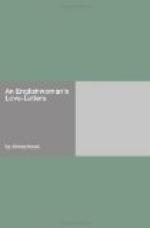I do not remember my father ever speaking of her to us as children: but I am sure there was no state of health to be concealed.
Last night I was talking to Aunt N—— about her. “A very dear woman,” she told me, “but your father was never so much alive to her worth as the rest of us.” Of him she said, “A dear, fine fellow: but not at all easy to get on with.” Him, of course, I have a continuous recollection of, and “a fine fellow” we did think him. My mother comes to me more rarely, at intervals.
Don’t talk me down your mother’s throat: but tell her as much as she cares to know of this. I am very proud of my “stock” which she thinks “poor”!
Dear, how much I have written on things which can never concern us finally, and so should not ruffle us while they last! Hold me in your heart always, always; and the world may turn adamant to me for aught I care! Be in my dreams to-night!
LETTER XVI.
But, Dearest: When I think of you I never question whether what I think would be true or false in the eyes of others. All that concerns you seems to go on a different plane where evidence has no meaning or existence: where nobody exists or means anything, but only we two alone, engaged in bringing about for ourselves the still greater solitude of two into one. Oh, Beloved, what a company that will be! Take me in your arms, fasten me to your heart, breathe on me. Deny me either breath or the light of day: I am yours equally, to live or die at your word. I shut my eyes to feel your kisses falling on me like rain, or still more like sunshine,—yet most of all like kisses, my own dearest and best beloved!
Oh, we two! how wonderful we seem! And to think that there have been lovers like us since the world began: and the world not able to tell us one little word of it:—not well, so as to be believed—or only along with sadness where Fate has broken up the heavens which lay over some pair of lovers. Oenone’s cry, “Ah me, my mountain shepherd,” tells us of the joy when it has vanished, and most of all I get it in that song of wife and husband which ends:—
“Not a word for you,
Not a lock or kiss,
Good-by.
We, one, must part in two;
Verily death is this:
I must die.”
It was a woman wrote that: and we get love there! Is it only when joy is past that we can give it its full expression? Even now, Beloved, I break down in trying to say how I love you. I cannot put all my joy into my words, nor all my love into my lips, nor all my life into your arms, whatever way I try. Something remains that I cannot express. Believe, dearest, that the half has not yet been spoken, neither of my love for you, nor of my trust in you,—nor of a wish that seems sad, but comes in a very tumult of happiness—the wish to die so that some unknown good may come to you out of me.




